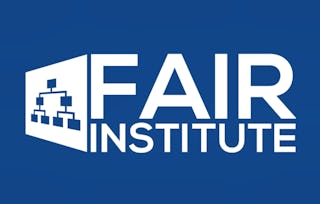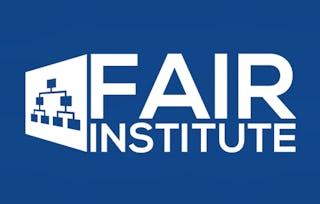This course focuses on the critical aspects of communicating cyber risk to stakeholders and establishing effective governance structures. Executives will learn to translate technical cyber risk concepts into business language, report to the board, and build a cyber risk-aware culture. The course also covers regulatory compliance, the role of cyber insurance, and techniques for resolving disputes and building consensus within the organization.

Executive Communication and Governance
3 days left! Gain next-level skills with Coursera Plus for $199 (regularly $399). Save now.

Executive Communication and Governance
This course is part of Cyber Risk Management for Executives Specialization


Instructors: FAIR Institute
Included with
Skills you'll gain
Details to know

Add to your LinkedIn profile
See how employees at top companies are mastering in-demand skills

Build your subject-matter expertise
- Learn new concepts from industry experts
- Gain a foundational understanding of a subject or tool
- Develop job-relevant skills with hands-on projects
- Earn a shareable career certificate

There are 3 modules in this course
This module is designed to equip participants with the skills to understand and communicate cyber risk in business terms using the FAIR (Factor Analysis of Information Risk) framework. It highlights the importance of presenting cyber risks in ways that resonate with business executives and stakeholders. Participants will explore how to translate technical risks into actionable business insights, prioritize security measures, and foster effective communication across the organization to support informed decision-making and risk management.
What's included
7 videos6 readings7 assignments1 peer review6 discussion prompts
This module focuses on the significance of effective communication in cyber risk management, particularly through the FAIR (Factor Analysis of Information Risk) framework. Participants will learn to communicate cyber risks to executives and board members effectively, align risk management efforts with business goals, and break down silos between security and business teams. The module covers the importance of framing cyber risk in business terms, best practices for board reporting, and strategies for achieving executive alignment in risk management.
What's included
8 videos6 readings9 assignments2 peer reviews7 discussion prompts
This module focuses on the governance of cyber risk at the executive level and the role of the FAIR (Factor Analysis of Information Risk) framework in setting global benchmarks for regulatory compliance. Participants will explore the gaps in cyber risk posture among C-suite executives, understand the principles of board governance, and examine the influence of new regulations on cybersecurity risk management. The module emphasizes the importance of standardizing cyber risk reporting and how the FAIR framework informs regulatory readiness and compliance.
What's included
4 videos7 readings5 assignments6 discussion prompts
Earn a career certificate
Add this credential to your LinkedIn profile, resume, or CV. Share it on social media and in your performance review.
Offered by
Explore more from Leadership and Management
 Status: Free Trial
Status: Free TrialStarweaver
 Status: Free Trial
Status: Free TrialFAIR Institute
 Status: Free Trial
Status: Free Trial Status: Free Trial
Status: Free TrialFAIR Institute
Why people choose Coursera for their career

Felipe M.

Jennifer J.

Larry W.

Chaitanya A.
Frequently asked questions
To access the course materials, assignments and to earn a Certificate, you will need to purchase the Certificate experience when you enroll in a course. You can try a Free Trial instead, or apply for Financial Aid. The course may offer 'Full Course, No Certificate' instead. This option lets you see all course materials, submit required assessments, and get a final grade. This also means that you will not be able to purchase a Certificate experience.
When you enroll in the course, you get access to all of the courses in the Specialization, and you earn a certificate when you complete the work. Your electronic Certificate will be added to your Accomplishments page - from there, you can print your Certificate or add it to your LinkedIn profile.
Yes. In select learning programs, you can apply for financial aid or a scholarship if you can’t afford the enrollment fee. If fin aid or scholarship is available for your learning program selection, you’ll find a link to apply on the description page.
More questions
Financial aid available,
¹ Some assignments in this course are AI-graded. For these assignments, your data will be used in accordance with Coursera's Privacy Notice.





